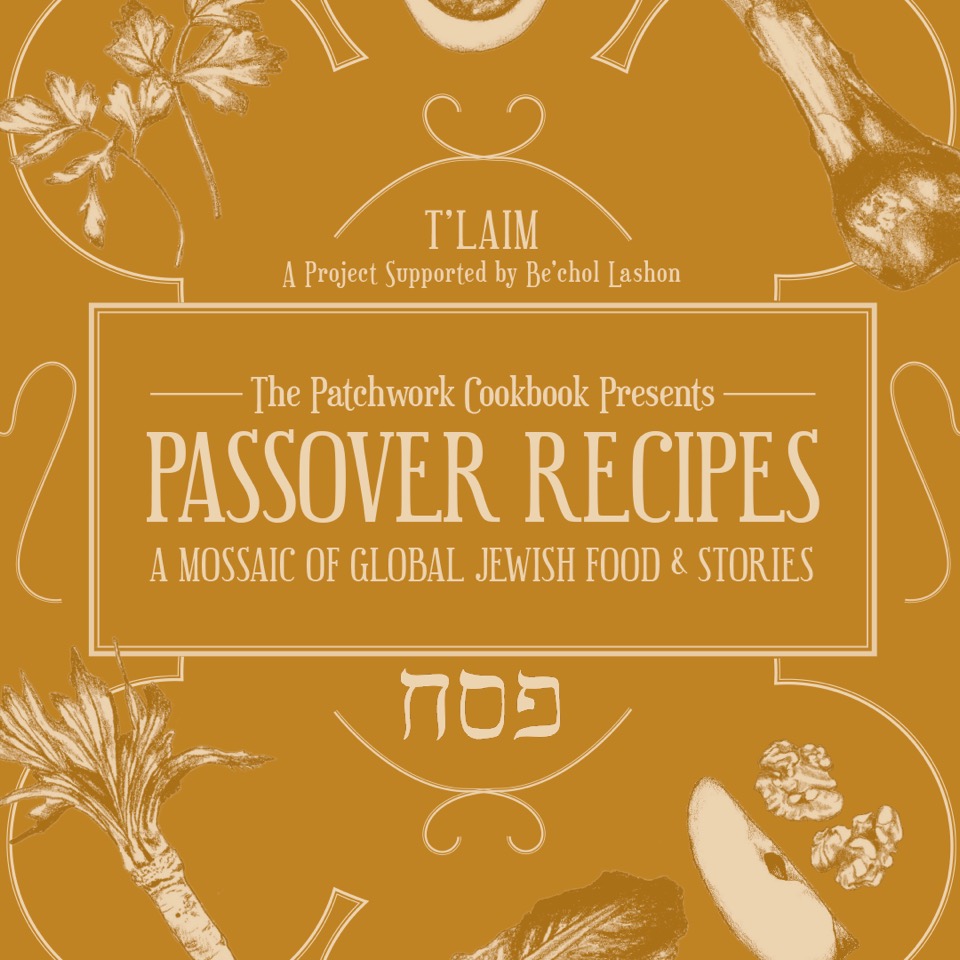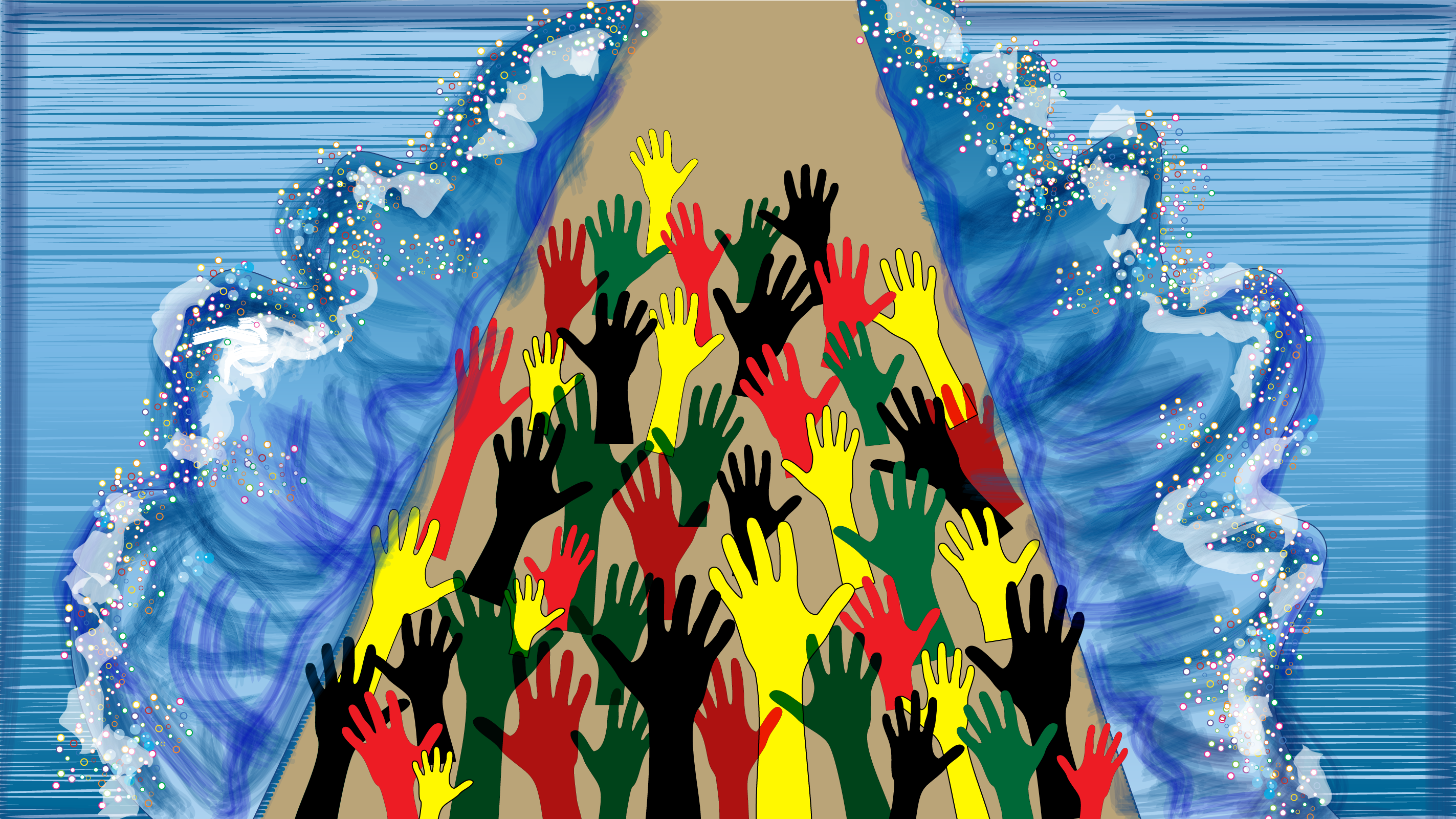Kendall Pinckney is a rabbinical student at Jewish Theological Seminary in New York and one of the stars of the viral Passover video “Saturday Night Seder.” We recently interviewed him on Facebook Live. Below are edited excerpts from the conversation.
How did you come to participate in “Saturday Night Seder?”
My background is in music and theater. Over the past year I got involved with this organization called Reboot. It’s a Jewish arts and culture organization that really tries to reimagine and reinvigorate Jewish traditions by engaging artists, entrepreneurs, activists, and the like, and catalyzing them to produce work that move some Jewish conversations forward.
So I went to a Reboot summit where I ended up meeting a lot of really wonderful people, including the person who is the head writer for the “Saturday Night Seder.” We became friendly, and he reached out, was like, “Hey, you want to contribute to this?” and I’m like, “Yeah, let me hop on that.”
So far the video has 1.2 million views on YouTube and over $2.6 million has been raised for the CDC Foundation to help with research efforts to combat the coronavirus pandemic. So mazel tov to you and everybody involved.
Seriously, it’s kind of humbling to know that when people put their minds and their energies and talents together that they can really bring such great energy to highlight a good cause. Ultimately that’s the best part of being part of that Seder, that we were able to contribute to raising money for research.
You told a story on the Seder broadcast that was edited to be very short. Can you tell the full story about this special Passover experience that you had?
Good eye to see the editing. It makes complete sense that it was edited. They wanted it to run a certain amount of time, and I’m a pretty long-winded person. I am a rabbinical student, after all!
So my actual Pesach memory was actually about this organization that I was a part of a while ago, and still am involved with. It’s called LABA. It’s a laboratory for Jewish artists who come together and study Jewish texts around a theme for a year. In my year we studied around the theme of physical beauty, and so we study about this theme, look at rabbinic and biblical texts on it, and then create works of art based on those themes.
It was a great experience, and around the time of Passover every year LABA does this thing called a “memory piece,” where you bring the entire group together and everyone brings a piece of food or a drink that’s connected to a deep memory that they have, and they tell that story so that way everyone else in the group gets to taste a bit of it and connect that taste to your memory.
In my case, I ended up sharing Grandma’s Cookies, those super, super sweet cookies that are produced or at least distributed by Frito-Lay. My dad used to work as a deliveryman for Frito-Lay, and I really love those cookies, and so anytime I see Grandma’s Cookies I associate it with my dad. I brought the oatmeal raisin Grandma’s Cookies, and it was great to be able to share that with everyone and have them share their memories. By the end of that we were all just like in tears, either from laughter or from seeing people share these vulnerable, moving memories.
Would you please tell us a little bit about your background and your journey to Judaism and to rabbinical school?
I grew up in a Black megachurch in Dallas, TX called Concord Church. I grew up in a religious family, religious Christians. We were very serious, very sincere, very committed to our tradition and to that faith. So I grew up with all of that and also with the heritage of having plenty of preachers in the family. There were definitely some thoughts that I was going to be a preacher when I grew up because I got involved with the arts when I was pretty young. I was in an international touring boys choir from about the age of 11 through the end of high school.
I ended up going to Oberlin College and conservatory after I finished high school, and while I was there I found myself drifting away from the religious community that I had grown up in for a number of reasons that I don’t have time to get into. And I was really intrigued by Judaism. It was something I was aware of even though I didn’t really grow up knowing any Jews, and so I decided that I would go to a Friday night service and then I would go to the meal after.
As I often like to recall, I went there overdressed with a Protestant Bible in hand thinking it was going to be like a Bible study service. So then when people started praying in the language that I did not understand, and standing and swaying and everything, I was like, what is going on? But I was intrigued and so I kept going back and kept getting more involved with Hillel. I studied with the rabbi there. After I graduated from Oberlin I moved to New York to do a masters of fine arts at NYU. And once I finished with that degree some of the work that I did immediately after was in the Brooklyn Jewish community, as I like to call it the Brooklyn Judeosphere.
I got involved with doing b’nai mitzvah tutoring because I had a fair amount of Hebrew from studying abroad in Israel. I joined the synagogue staff. I taught after school Jewish education and also ran the Jewish youth group. It was like all of these things just pointed towards, ok, it seems like you like doing this, this is meaningful for you, what’s the next step to really enable me to gain more skills and also increase my impact within the communities. So it seemed like going to rabbinical school made a lot of sense, and JTS was a perfect fit for me.
Because of coronavirus you are no longer meeting in person for classes. How are you continuing to be involved in Jewish life from home?
We’re now learning online. It’s sad to not be in person with my professors and with my colleagues, but it’s been really impressive to see just how everyone’s taking it in stride and is adapting so well.
In terms of participating in Jewish life, I’ll be real, it’s difficult because there’s nothing that takes the place the place of being in person and doing Jewish in person. I would say that I’m doing a whole lot of learning, going to a lot of online learning sessions, in some cases hopping onto a Kabbalat Shabbat before sundown on Shabbat, and getting a little bit of virtual community before I head into Shabbat proper.
Also I’m just finding more time to connect with my peers and check in with people. I have to admit, I’m an introvert, so I’m actually doing okay with some of the distancing and solitude stuff. But even with that being said, it becomes that much more important to really take the time and energy to keep up with people. I have a weekly learning session with one of my favorite rabbis at JTS, Rabbi Bill Lebeau, who used to be the dean of the rabbinical school, with him. He’s such an inspiration.
What do you hope to do with your rabbinate once you graduate from JTS?
What I really hope to do is bring together my love for the arts and my love of Jewish texts in order to be what I like to think of as an “arts rabbi.” To some extent that means just continuing my own artistic work. And then the second part would be actually working with artists, whether it’s artists who are very much identified as involved and religious Jews, to artists who would describe themselves as artists who happen to be Jews. I want to be able to support them and connect them to the texts and the wisdom of their heritage, and I also want to be able to provide pastoral counseling to them.
One of the things that can be frustrating is that in the Jewish community and in many communities, it seems that artists aren’t really taken seriously unless they get a big prize or they win a big award. But it’s like, artists end up contributing so much to culture and to the progress of culture. So I really want to focus on supporting them because I think that they give so much to the world, more broadly, and to klal yisrael [“the Jewish people”] more specifically.
What advice would you give to other Jews of color who are interested in going to rabbinical school and becoming rabbis?
The first thing that comes to mind is: Hebrew, Hebrew, Hebrew. Get on your Hebrew, learn your Hebrew, learn it as best you can. It’s hard to gain access to the nuances of some of our fundamental texts and traditions without Hebrew, but also it’s one of the major languages of our people. So inasmuch as a person can really take the time to improve their Hebrew and add in a smattering of Aramaic as well, I think the returns on that investment will just be so high, so that’s the first thing.
The second thing is, and maybe this is self-evident and maybe even possibly cliché, but it’s really important to embrace the fullness of all of one’s identity. I would say that it took me a while to not closet or compartmentalize all aspects of my identity. And it wasn’t because I was made to feel like I didn’t belong at JTS. In fact, JTS has been very warm and welcoming and affirming of my background. Rather, it’s just when you are one of the only people of color at your institution, and the first Black person who’s going through the rabbinical program, I did not necessarily know exactly how I can bring all of myself.
I would say that this past year has really been a chance to kind of really test that. Can I bring my full self? And thankfully I’ve found through my conversations with friends, professors, and colleagues that people are much more willing for you to be exactly who you are, and that’s been amazing, to feel welcomed and to feel held.
Also, reach out to other Jews of color if you are having questions or concerns. Jews of color make up by some statistics as much as 20% of the American Jewish population, and what’s more is that there are Jewish professionals who are Jews of color or Jews from non-exclusively Ashkenazi backgrounds, so there are people out there. Reach out. I’ve found that in reaching out to most folks, they’re really open to sharing their time and sharing their experience and being a resource.







